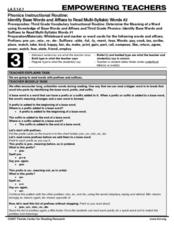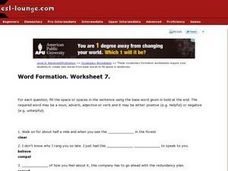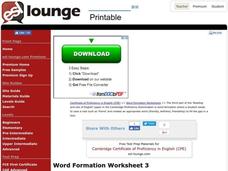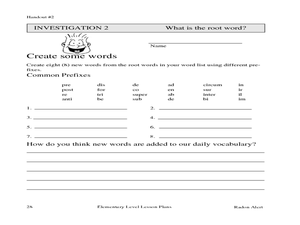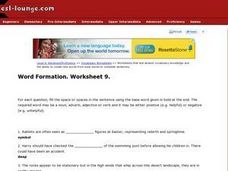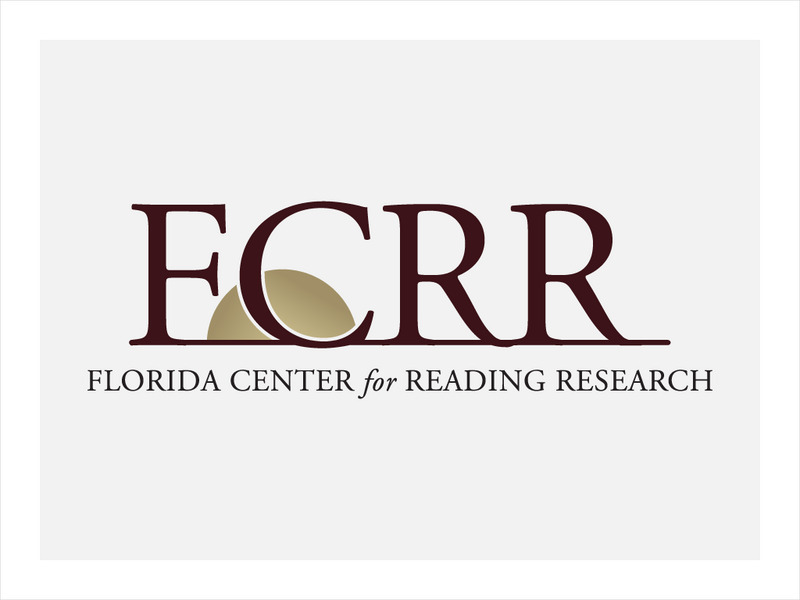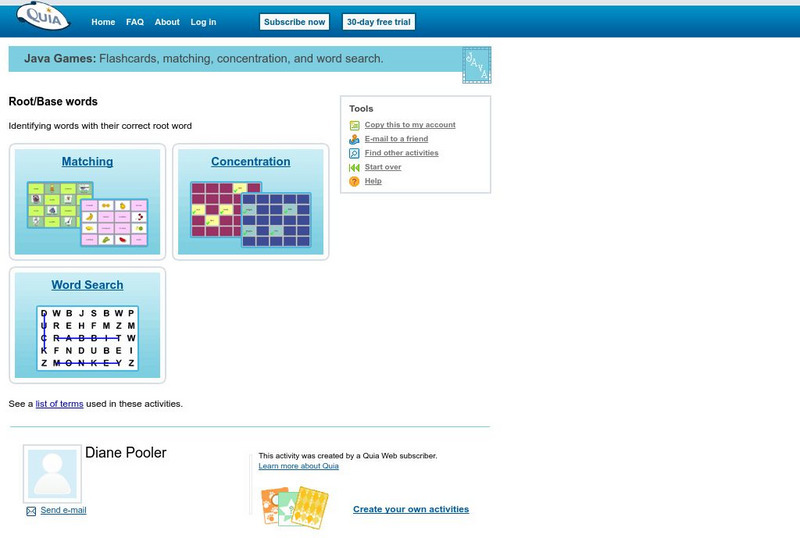Curated OER
Phonics: Identify Base Words and Affixes to Read Multi-Syllabic Words
Encountering a new an unfamiliar word can stump even the best readers. Third graders learn how to assess the base, prefix, and suffix of words to help them determine its meaning. The class works together to go over a series of common...
Curated OER
Word Formation Worksheet 7
In this ESL word formation instructional activity, students read 7 sentences that have a missing word. Students fill the space using the base word given in bold at the end. Prefixes and suffixes may be added.
Curated OER
Word Formation
In this word formation instructional activity, students fill in the spaces in six sentences with the base word given in bold in its correct form.
Curated OER
ESL: Advanced/Proficiency Word Formation Worksheet
In this ESL word formation worksheet, students fill in the space or spaces in a sentence using the given base word. They complete 6 sentences.
Curated OER
Word Formation Worksheet 1
In this ESL vocabulary building worksheet, students read 10 sentences that have a missing word. Using the base word provided, students fill in the space with a noun, adverb, adjective or verb that fits the sentence.
Curated OER
Plural Nouns
Working from the plural versions of nouns (in the context of sentences), your learners write the singular version of the underlined noun on the blank line underneath each sentence.
Curated OER
Investigation 2: hat is the Root Word?
In this identifying the base words worksheet, young scholars read two columns of words and write their root words, use a dictionary to find new words that use the root words from the word list, and read common prefixes and create new...
Curated OER
Word Formation #6
In this word formation worksheet, students practice creating new words from base words to place in each blank in ten sentences in order to make each one grammatically correct.
Curated OER
Word Formation Worksheet 9
In this ESL spelling worksheet, students will focus on vocabulary enhancement. Students will complete 10 fill in the blank questions, by reading each sentence using the correct form of the given base word to complete each.
Curated OER
Food Poems and Base Words
Young scholars identify base words to decipher new vocabulary. In this vocabulary lesson, students complete a graphic organizer while reading about food and nutrition. Young scholars discuss simple and complex endings when using...
Curated OER
Match the prefixes
In this prefixes worksheet, students match the base words with their appropriate prefixes. Students complete 5 matches total.
Curated OER
Match the suffixes
In this suffixes worksheet, students match the suffixes to the base words they go with. Students match 10 suffixes to 10 different base words.
Curated OER
Match the Prefixes
In this prefixes worksheet, students match the prefixes to the base words. Students match 2 prefixes to 2 base words given to them.
Curated OER
In My World
Students identify base words and their inflectional forms. In this base words lesson plan, students learn how adding "ing" can change the meaning of the word, and they fill in a chart with different forms of base words.
Curated OER
Vocabulary Formation Worksheet 17
In this ESL advanced vocabulary worksheet, young scholars read 8 sentences that have a missing word. Students use a form of the base word in bold type at the end of the sentence to fill in each space.
Curated OER
Fix a Sandwich Stack
Sixth graders compare the meanings of the base words with the meanings of the words with added prefixes and suffixes. In this word analysis lesson, 6th graders explore base words, prefixes, and suffixes by finding words in print which...
ReadWriteThink
Read Write Think: Word Study With Henry and Mudge
Contains plans for six second or third grade lessons that use "Henry and Mudge: The First Book" by Cynthia Rylant to teach high-frequency spelling words, base words, the past tense marker -ed, phonemic patterns, predicting, and...
Sophia Learning
Sophia: Prefixes
This lesson focuses on prefixes; it defines prefix, and discusses the purpose of prefixes and how they can change the base word. It also provides a list of common prefixes with their meanings.
Florida Center for Reading Research
Florida Center for Reading Research: Morpheme Structures: Affix Hunt
A lesson plan in which students identify prefixes and suffixes on word cards. Materials are included.
Florida Center for Reading Research
Florida Center for Reading Research: Inflection Toss
Students will blend base words and inflections to make words by playing a bean bag game.
Florida Center for Reading Research
Florida Center for Reading Research: Prefix and Suffix Flip Book
The student will blend base words and affixes to make words.
Quia
Quia: Root/base Words
Three activities including a matching game, a concentration game, and a word search puzzle for students to use while learning and practicing the meanings of various root words.
Quia
Quia: Root/base Words
In this learning game, students match words with their correct root word.
Sophia Learning
Sophia: Common Roots and Their Meanings
This slideshow lesson introduces common roots words (or base words) and their meanings. It explains that some can stand alone while others require prefixes or suffixes to form words. L.9-10.4b Patterns/word changes


